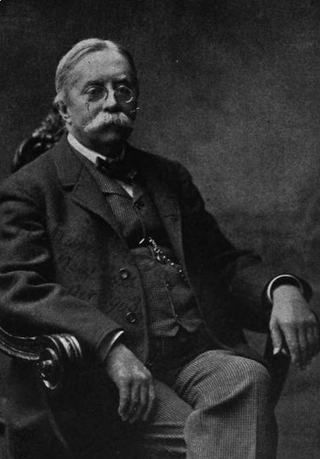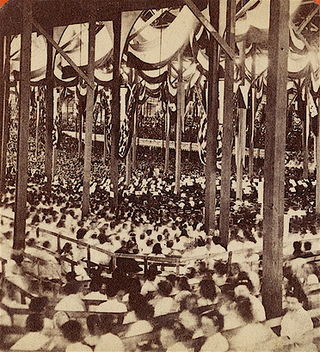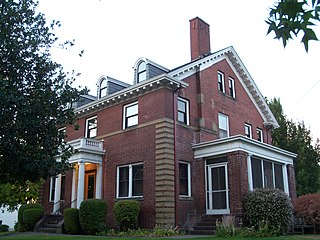
Shape notes are a musical notation designed to facilitate congregational and social singing. The notation, introduced in late 18th century England, became a popular teaching device in American singing schools. Shapes were added to the noteheads in written music to help singers find pitches within major and minor scales without the use of more complex information found in key signatures on the staff.

A hymnal or hymnary is a collection of hymns, usually in the form of a book, called a hymnbook. They are used in congregational singing. A hymnal may contain only hymn texts ; written melodies are extra, and more recently harmony parts have also been provided.
Massachusetts is a U.S. state in New England. The music of Massachusetts has developed actively since it was first colonized by Britain. The city of Boston is an especially large part of the state's present music scene, which includes several genres of rock, as well as classical, folk, and hip hop music.

Lowell Mason was an American music director and banker who was a leading figure in 19th-century American church music. Lowell composed over 1,600 hymn tunes, many of which are often sung today. His best-known work includes an arrangement of "Joy to the World" and the tune Bethany, which sets the hymn text Nearer, My God, to Thee. Mason also set music to Mary Had A Little Lamb. He is largely credited with introducing music into American public schools, and is considered the first important U.S. music educator. He has also been criticized for helping to largely eliminate the robust tradition of participatory sacred music that flourished in North America before his time.

Bela Lyon Pratt was an American sculptor from Connecticut.

William Mason was an American composer and pianist and a member of a musical family. His father was composer Lowell Mason, a leading figure in American church music, and his younger brother, Henry Mason, was a co-founder of the piano manufacturers Mason & Hamlin.
The 31st Annual GMA Dove Awards were held on April 20, 2000, recognizing accomplishments of musicians for the year 1999. The show was held at the Grand Ole Opry House in Nashville, Tennessee, and was hosted by Kathie Lee Gifford.
The Second New England School or New England Classicists is a name given by music historians to a group of classical-music composers who lived during the late-19th and early-20th centuries in New England. More specifically, they were based in and around Boston, Massachusetts, then an emerging musical center. The Second New England School is viewed by musicologists as pivotal in the development of an American classical idiom that stands apart from its European ancestors.

The National Peace Jubilee was a celebration that commemorated the end of the American Civil War, organized by Patrick Gilmore in Boston from June 15-19, 1869. It featured an orchestra and a chorus, as well as numerous soloists. More than 11,000 performers participated, including the famous violinist Ole Bull as the orchestra's concertmaster, and Carl Zerrahn as director of the choral forces. The Jubilee became the "high-water mark in the influence of the band in American life". Along with the World's Peace Jubilee and International Musical Festival in 1872, it made Gilmore a famous composer and bandmaster. For the Jubilee, a newly commissioned "Hymn of Peace" was written by Dr. Oliver Wendell Holmes, set to the music from "American Hymn" by Matthias Keller (1813-1875) and performed on the opening day.
This is a timeline of music in the United States from 1820 to 1849.
This timeline of music in the United States covers the period from 1850 to 1879. It encompasses the California Gold Rush, the Civil War and Reconstruction, and touches on topics related to the intersections of music and law, commerce and industry, religion, race, ethnicity, politics, gender, education, historiography and academics. Subjects include folk, popular, theatrical and classical music, as well as Anglo-American, African American, Native American, Irish American, Arab American, Catholic, Swedish American, Shaker and Chinese American music.
This is a timeline of music in the United States from 1880 to 1919.

John Hill Belcher Mason was an American stage actor popular during the decades surrounding the start of the twentieth century.

The Hidden Houses are a pair of historic houses located in Vancouver, Washington. They are listed on the National Register of Historic Places.
Elam Ives Jr. (1802–1864) was a New England-based music teacher whose work with William Channing Woodbridge helped introduce the ideas of Johann Heinrich Pestalozzi into music education in the United States. His work also influenced Lowell Mason, whose work with Woodbridge eventually led to music education being introduced into the public schools of Boston.
Benjamin Franklin Baker was an American educator and composer.

Alice May Bates Rice was a soprano singer, born in the U.S. state of Massachusetts.
The 84th Massachusetts General Court, consisting of the Massachusetts Senate and the Massachusetts House of Representatives, met in 1863 during the governorship of John Albion Andrew. Jonathan E. Field served as president of the Senate and Alexander Hamilton Bullock served as speaker of the House.









